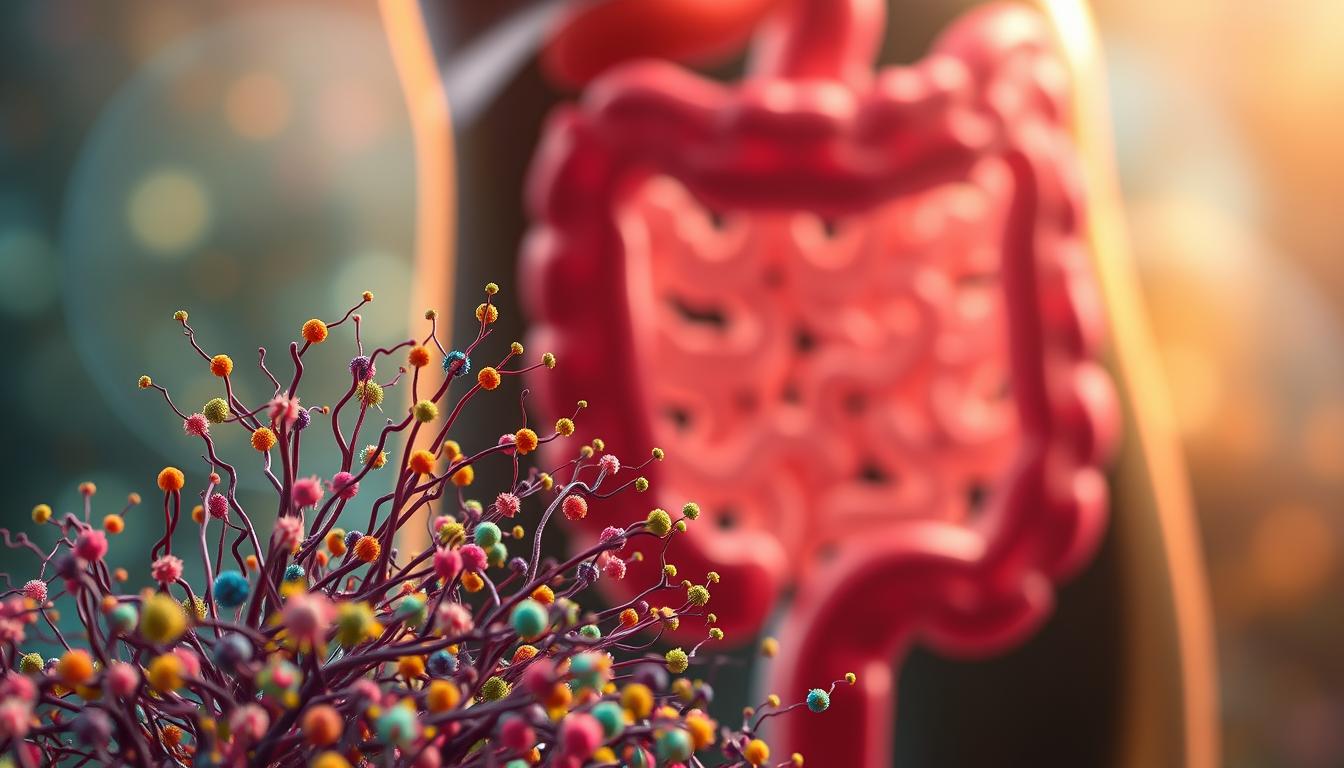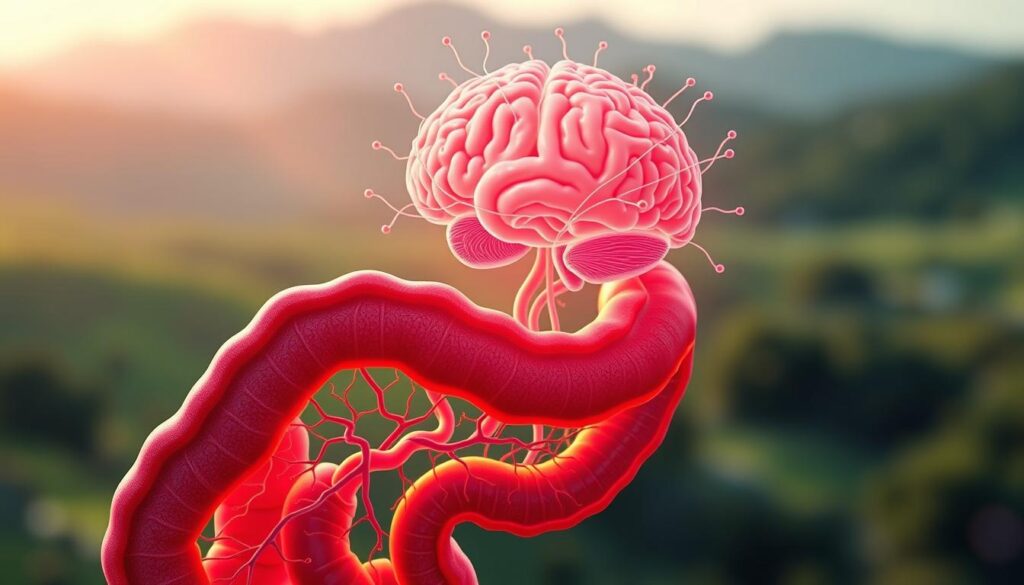Have you ever wondered why some people seem to digest food effortlessly while others struggle with persistent discomfort? The answer lies in the complex ecosystem of our digestive system, where gut microbiome significance plays a crucial role.
The delicate balance of our gut microbiome influences not just our digestive health but our overall well-being. A healthy gut contributes to a strong immune system, efficient metabolism, and even mental clarity.
Understanding the importance of gut health can unlock numerous benefits of gut health, from improved digestion to enhanced overall wellness. As we explore the intricacies of gut health, we’ll uncover how maintaining a balanced gut microbiome is essential for gut health and overall wellness.
Key Takeaways
Table of Contents
- The gut microbiome plays a crucial role in our overall health.
- A balanced gut contributes to a strong immune system and efficient metabolism.
- Understanding gut health is key to unlocking its benefits.
- Gut health influences not just digestion but overall well-being.
- Maintaining a healthy gut microbiome is essential for overall wellness.
What is Gut Health and Why It Matters
The gut microbiome plays a vital role in our overall health. It is composed of trillions of microorganisms living in the digestive tract, influencing various bodily functions, from digestion to immune response. Understanding gut health is essential for maintaining overall wellness.
Defining the Gut Microbiome
The gut microbiome refers to the community of microorganisms residing in the gastrointestinal tract. These microbes are crucial for breaking down food, synthesizing vitamins, and regulating the immune system. A balanced gut microbiome is key to optimal health.
The gut microbiome is influenced by various factors, including diet, lifestyle, and environmental exposures. A diverse gut microbiome is generally considered a marker of good health.
The Ecosystem Within Us
The gut microbiome functions as a complex ecosystem within us, interacting with the body’s systems to maintain health. It produces metabolites that influence our metabolism, energy levels, and even mental health.
A healthy gut microbiome is characterized by a balance between different microbial species. This balance is crucial for preventing diseases and maintaining overall well-being.
| Aspect of Health | Influence of Gut Microbiome |
|---|---|
| Digestion | Breaks down complex foods, aids nutrient absorption |
| Immune System | Regulates immune response, prevents infections |
| Mental Health | Produces neurotransmitters, influences mood |
The Gut-Brain Connection
Our gut health is directly linked to our brain function, impacting our mood, cognitive abilities, and more. This complex relationship is facilitated by the gut-brain axis, a bidirectional communication network between the central nervous system (CNS) and the enteric nervous system (ENS).
How Your Gut Communicates with Your Brain
The gut and the brain communicate through various pathways, including the vagus nerve, which is a key conduit for signaling between the gut microbiome and the CNS. The gut microbiome produces neurotransmitters and hormones that can influence mood and cognitive functions.
The role of the gut microbiome in producing serotonin, a neurotransmitter that regulates mood, is particularly noteworthy. A significant portion of the body’s serotonin is produced in the gut, highlighting the gut’s influence on mental health.
Impact on Mental Health and Mood
The gut-brain connection has significant implications for mental health. Research has shown that alterations in the gut microbiome are associated with various mental health disorders, including anxiety and depression.
| Gut Microbiome Aspect | Impact on Mental Health |
|---|---|
| Diversity of Microbiome | Lower diversity linked to higher rates of depression |
| Presence of Certain Microbes | Some microbes produce neurotransmitters that influence mood |
| Gut Barrier Integrity | Compromised barrier can lead to inflammation, affecting mental health |
Understanding the gut-brain connection opens new avenues for managing mental health through dietary interventions and modulation of the gut microbiome.
Gut Health and Your Immune System
The gut and immune system are intricately connected, playing a vital role in our overall health. A significant portion of our immune system is located in the gut, where the gut microbiome plays a crucial role in immune function.
The First Line of Defense
The gut microbiome acts as the first line of defense against pathogens. It helps to:
- Regulate the immune response
- Produce antimicrobial peptides
- Maintain the integrity of the gut barrier
A balanced gut microbiome is essential for preventing the overgrowth of harmful bacteria and maintaining immune homeostasis. When the gut microbiome is imbalanced, it can lead to impaired immune function and increased susceptibility to infections.
Inflammation and Autoimmune Connections
The gut microbiome also plays a critical role in regulating inflammation and autoimmune responses. An imbalance of the gut microbiome, also known as dysbiosis, has been linked to various autoimmune diseases, including:
- Rheumatoid arthritis
- Lupus
- Multiple sclerosis
By maintaining a healthy gut microbiome, individuals can potentially reduce their risk of developing these conditions and support overall immune health.
Signs of Poor Gut Health
Recognizing the indicators of poor gut health can be the first step towards achieving a healthier gut microbiome. A balanced gut is essential for overall wellness, influencing not just digestive health but also mental well-being and immune function.

Digestive Symptoms to Watch For
Digestive issues are often the most immediate signs of gut imbalance. Common symptoms include bloating, gas, abdominal pain, and changes in bowel movements such as diarrhea or constipation. These symptoms can significantly impact daily life and are often linked to the digestive health importance in overall wellness.
Other digestive symptoms might include nausea, especially after eating certain foods, and a feeling of fullness or discomfort. If you experience persistent or severe digestive issues, it’s crucial to consider the health of your gut microbiome.
Non-Digestive Indicators of Gut Imbalance
Beyond digestive symptoms, poor gut health can manifest in various non-digestive ways. Skin issues such as acne, eczema, or rashes can be linked to gut imbalance. Additionally, fatigue, mood swings, and difficulty concentrating may also indicate that your gut health is suffering.
The connection between the gut and overall health is complex, highlighting the gut health and overall wellness interlinkage. For instance, research has shown that gut health can influence mental health, with some studies suggesting a link between gut imbalance and conditions like anxiety and depression.
By being aware of these signs and taking proactive steps, individuals can begin to address potential gut health issues, improving not just their digestive health but their overall quality of life.
7 Steps to Improve Your Gut Health
To boost your gut health, consider a holistic approach that encompasses nutrition, hydration, exercise, and stress reduction. By making informed choices in these areas, you can significantly enhance your overall wellness and potentially mitigate various health issues.
Diversify Your Diet with Fiber-Rich Foods
Dietary diversification is key to a healthy gut microbiome. Consuming a variety of fiber-rich foods such as fruits, vegetables, and whole grains helps promote the growth of beneficial bacteria. Increasing fiber intake can improve digestion and enhance the immune system. Aim to include a wide range of colors on your plate to ensure you’re getting a broad spectrum of nutrients.
Incorporate Fermented Foods
Fermented foods are rich in probiotics, which are beneficial bacteria that can help populate your gut with healthy microbes. Foods like yogurt, kefir, sauerkraut, and kimchi are excellent choices. Incorporating these into your diet can enhance gut flora and improve digestion. Start with small servings to allow your gut to adjust.
Limit Processed Foods and Sugar
Processed foods and high sugar intake can negatively impact gut health by promoting the growth of harmful bacteria. Reducing consumption of these foods can help maintain a balanced gut microbiome. Opt for whole, nutrient-dense foods as much as possible to support gut health.
Stay Hydrated
Adequate hydration is essential for digestive health. Water helps dissolve nutrients and soluble fiber, making them more accessible to the body. It also assists in preventing constipation by softening stool and promoting regular bowel movements. Aim to drink plenty of water throughout the day.
Manage Stress Levels
High stress levels can adversely affect gut health. Stress can alter the gut microbiota and impair the gut barrier. Engaging in stress-reducing activities such as meditation, yoga, or deep breathing exercises can help mitigate this impact and support a healthy gut.
Get Regular Exercise
Regular physical activity can enhance gut motility and improve the diversity of the gut microbiome. Exercise is also known to reduce stress and improve overall health. Aim for at least 30 minutes of moderate exercise most days of the week to support gut health.
Consider Probiotic Supplements
If you’re struggling to get enough probiotics from your diet, consider taking a probiotic supplement. Probiotics can help restore the balance of gut bacteria, especially after illness or antibiotic use. Consult with a healthcare professional to choose the right probiotic for your needs.
By following these seven steps, you can take proactive measures to improve your gut health, enhancing your overall well-being and potentially reducing the risk of various diseases.
Conclusion: Your Journey to Better Gut Health
Understanding the importance of gut health is the first step towards achieving overall wellness. As discussed, the gut microbiome plays a crucial role in our overall health, influencing everything from our digestive system to our mental well-being and immune function.
Maintaining a healthy gut is not just about avoiding digestive issues; it’s about supporting our overall health. By incorporating simple changes into our daily routine, such as diversifying our diet with fiber-rich foods, incorporating fermented foods, and managing stress levels, we can significantly improve our gut health and overall wellness.
The gut health impact on our well-being cannot be overstated. By taking control of our gut health, we can enhance our quality of life. The importance of gut health lies in its ability to influence our overall health, making it a critical aspect of our overall wellness.
Embarking on a journey to better gut health is a step towards a healthier, happier you. By making informed choices and adopting healthy habits, you can improve your gut health and, in turn, enhance your overall well-being.
FAQ
What is gut health, and why is it important for overall wellness?
Gut health refers to the balance and diversity of the gut microbiome, which plays a crucial role in digestion, immune function, and overall health. Maintaining good gut health is essential for preventing various diseases and promoting overall wellness.
How does the gut microbiome influence mental health and mood?
The gut microbiome produces neurotransmitters and hormones that communicate with the brain, influencing mood, cognitive function, and mental health. An imbalance of the gut microbiome has been linked to various mental health conditions, including anxiety and depression.
What are the signs and symptoms of poor gut health?
Common signs of poor gut health include digestive issues such as bloating, abdominal pain, and changes in bowel movements. Non-digestive symptoms can include fatigue, skin issues, and mood disturbances.
How can I improve my gut health through diet?
Eating a diverse diet rich in fiber, incorporating fermented foods, and limiting processed foods and sugar can help promote a healthy gut microbiome. Staying hydrated and managing stress levels are also essential for maintaining good gut health.
What is the gut-brain connection, and how does it impact overall health?
The gut-brain connection refers to the bidirectional communication network between the gut microbiome and the central nervous system. This connection plays a crucial role in regulating various physiological processes, including digestion, immune function, and mental health.
Can probiotics help improve gut health?
Probiotics are live microorganisms that can help restore the balance of the gut microbiome. Certain probiotic strains have been shown to improve digestive health, boost the immune system, and even support mental health.
How does gut health impact the immune system?
The gut microbiome plays a critical role in supporting the immune system, with a significant portion of immune cells residing in the gut. A healthy gut microbiome helps to regulate immune function, preventing excessive inflammation and reducing the risk of autoimmune diseases.
What are some simple lifestyle changes I can make to support gut health?
In addition to dietary changes, staying hydrated, managing stress levels, and engaging in regular exercise can help promote a healthy gut microbiome. Getting enough sleep and avoiding antibiotics unless necessary can also support gut health.

